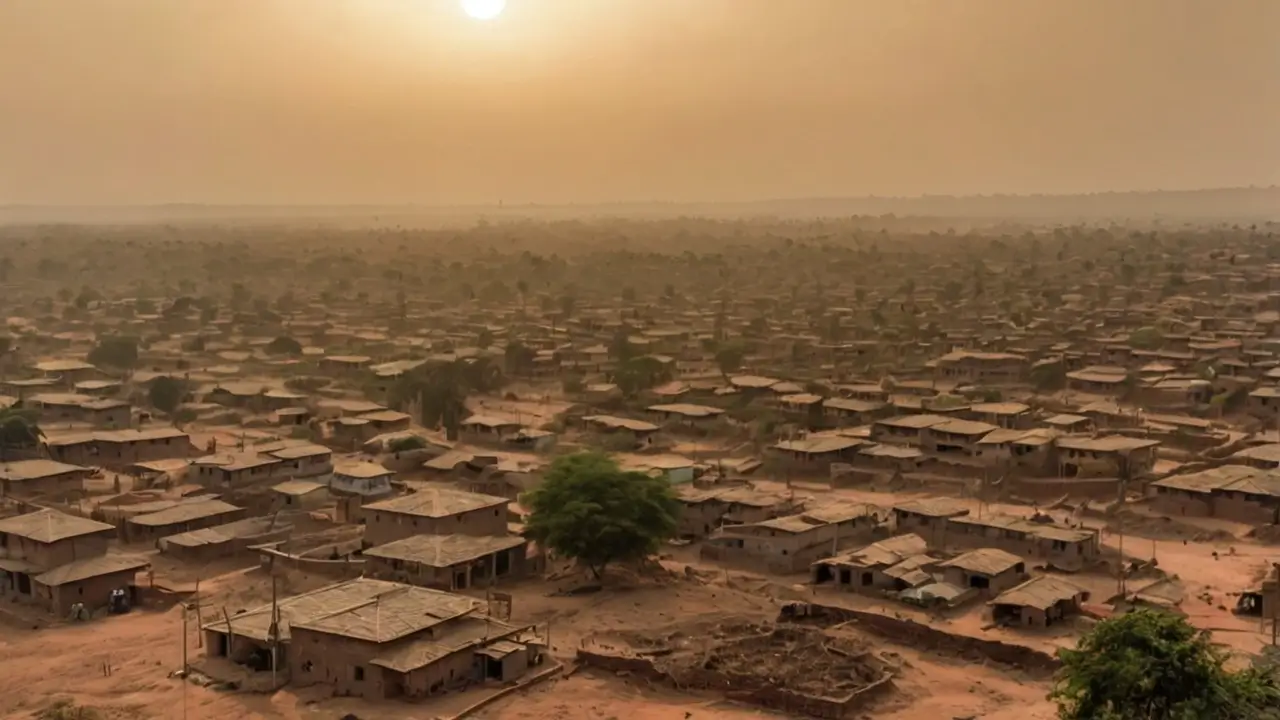
Table of Contents
ToggleUnderstanding the Harmattan Season in Northern Nigeria
The harmattan is a dry, dusty wind that blows from the Sahara Desert over West Africa, including Northern Nigeria, typically from November to March. This seasonal weather pattern carries fine particles of dust and sand, significantly reducing humidity and visibility while creating various health and environmental challenges.
Key Characteristics of Harmattan
- Duration: Usually lasts from November to March
- Temperature: Cold mornings and evenings, hot afternoons
- Humidity: Extremely low (often below 15%)
- Visibility: Significantly reduced due to dust particles
- Air Quality: Poor, with high particulate matter concentration
Northern Nigeria experiences some of the most intense harmattan conditions in West Africa, with cities like Kano, Kaduna, Sokoto, and Maiduguri particularly affected. The dust-laden air can cause respiratory problems, skin issues, and damage to electronics and other belongings.
Health Risks Associated with Harmattan Dust
Before discussing protection strategies, it’s important to understand what we’re protecting against. Harmattan dust poses several health risks that residents should be aware of:
| Health Concern | Impact of Harmattan Dust |
|---|---|
| Respiratory System | Irritation of airways, aggravation of asthma, bronchitis, and other respiratory conditions |
| Skin | Dryness, cracking, irritation, and exacerbation of eczema and other skin conditions |
| Eyes | Irritation, redness, itching, and potential infections |
| Nasal Passages | Dryness, nosebleeds, and increased susceptibility to infections |
| Overall Health | Dehydration, fatigue, and reduced immunity |
Understanding these risks emphasizes the importance of taking protective measures during the harmattan season.
Essential Personal Protection Strategies
Respiratory Protection
Protecting your respiratory system should be a top priority during harmattan season:
- Wear face masks: Use N95 or KN95 masks when outdoors, as these filter out at least 95% of airborne particles.
- Use cloth face coverings: When specialized masks aren’t available, multi-layered cloth masks can provide some protection.
- Breathe through your nose: Nasal passages naturally filter air better than mouth breathing.
- Limit outdoor activities: Particularly during peak dusty periods or when winds are strong.
- Consider a home air purifier: HEPA filter air purifiers can significantly reduce indoor dust levels.
“Respiratory protection isn’t just about comfort—it’s about preventing long-term health impacts from repeated exposure to harmattan dust.” — Nigerian Respiratory Health Association
Skin Protection
The extremely dry air during harmattan can severely affect your skin:
- Moisturize frequently: Apply petroleum jelly, shea butter, or other heavy moisturizers multiple times daily.
- Avoid hot water: Use lukewarm water for bathing to prevent further drying of skin.
- Cover exposed skin: Wear long sleeves and pants when outdoors to minimize dust contact with skin.
- Stay hydrated: Drink plenty of water to maintain skin hydration from within.
- Use gentle soaps: Avoid harsh soaps that strip natural oils from the skin.
Eye Protection
Your eyes are particularly vulnerable to harmattan dust:
- Wear sunglasses or protective eyewear: Choose wrap-around styles for maximum protection.
- Use lubricating eye drops: Apply preservative-free eye drops to keep eyes moist.
- Avoid rubbing your eyes: This can cause irritation and potentially scratch the cornea if dust particles are present.
- Consider protective goggles: For those who work outdoors or have sensitive eyes.
Hydration and Nutrition
Internal protection is just as important as external measures:
- Increase water intake: Aim for at least 3-4 liters daily to combat the dehydrating effects.
- Consume fruits and vegetables: Foods with high water content help maintain hydration.
- Limit dehydrating substances: Reduce intake of caffeine and alcohol, which can worsen dehydration.
- Consider humidifying foods: Soups, stews, and other moist foods help maintain internal hydration.
Home Protection Strategies
Preventing dust from entering your living space is crucial:
- Weather-strip doors and windows: Apply adhesive-backed foam tape to seal gaps.
- Use door sweeps: Install them at the bottom of exterior doors to block dust.
- Seal cracks and openings: Use caulk for small openings in walls and around windows.
- Consider window films: These can provide an additional barrier against fine dust.
- Create an entry transition zone: Place mats at entrances and remove shoes to prevent tracking dust indoors.
Indoor Air Quality Management
Once your home is sealed, focus on managing the air quality inside:
- Use air purifiers: HEPA filter devices can remove up to 99.97% of airborne particles.
- Maintain humidity levels: Use humidifiers to keep indoor humidity between 40-60%.
- Clean air conditioner filters: Clean or replace filters more frequently during harmattan.
- Consider indoor plants: Some plants like Snake Plant, Peace Lily, and Spider Plant can help filter air.
“Creating a clean air sanctuary in your home during harmattan is one of the most effective health protection strategies.” — Environmental Health Expert
Regular Cleaning Practices
Modified cleaning routines can significantly reduce dust accumulation:
- Damp dusting: Use slightly damp cloths rather than dry dusters that can redistribute dust.
- Vacuum with HEPA filter: Regular vacuuming with high-efficiency filters captures more dust.
- Wash bedding weekly: Dust settles on bedding, so frequent washing is essential.
- Reduce fabric items: Temporarily store unnecessary cushions, throws, and fabric items that collect dust.
- Clean from top to bottom: Start with ceiling fans and high surfaces, working your way down.
Vehicle Protection During Harmattan
Vehicles require special attention during harmattan season:
Interior Protection
- Keep windows closed: Maintain a sealed environment while driving.
- Use air recirculation: When using air conditioning, set to recirculate mode.
- Replace cabin air filters: Do this more frequently during harmattan season.
- Use car covers: When parked for extended periods, especially outdoors.
Mechanical Protection
- Check air filters regularly: Engine air filters can clog more quickly during harmattan.
- Protect electronics: Dust can damage electronic components; consider protective covers.
- More frequent oil changes: Dust can contaminate engine oil more rapidly.
- Check cooling systems: Ensure radiators don’t become clogged with dust.
Technology and Electronics Protection
Electronic devices are particularly vulnerable to harmattan dust:
- Use protective cases: Dust-proof cases for phones, tablets, and laptops.
- Cover equipment when not in use: Simple dust covers for computers and TVs.
- Clean devices regularly: Use compressed air cans designed for electronics.
- Consider silica gel packets: Place near electronics to absorb moisture.
- Maintain optimal operating temperatures: Prevent overheating which can attract more dust.
Community and Workplace Measures
Workplace Strategies
- Implement dust control policies: Regular cleaning schedules and air purification.
- Provide PPE: Employers should supply masks and other protective equipment.
- Flexible working hours: Consider adjusting work times to avoid peak dust periods.
- Indoor air quality monitoring: Install air quality sensors in workplaces.
Community Initiatives
- Tree planting: Communities can reduce dust through strategic vegetation.
- Road treatment: Water spraying on unpaved roads reduces dust.
- Public awareness campaigns: Educate community members about protection measures.
- Support vulnerable populations: Ensure elderly, children, and those with respiratory conditions have access to protection.
Special Considerations for Vulnerable Groups
Children
- Limit outdoor playtime: Schedule activities during less dusty times of day.
- Child-sized masks: Ensure proper fit for effective protection.
- School policies: Advocate for indoor recess during high dust days.
- Regular hydration: Children often forget to drink water; schedule regular reminders.
Elderly and Those with Pre-existing Conditions
- Medication adherence: Ensure asthma and other respiratory medications are taken as prescribed.
- Create clean rooms: Designate one room with extra air purification.
- Check in regularly: Daily wellness checks during severe harmattan periods.
- Emergency planning: Have a plan for accessing healthcare if conditions worsen.
Traditional and Modern Solutions
Northern Nigerians have developed both traditional and modern approaches to harmattan protection:
Traditional Methods
- Shea butter application: Used traditionally for skin protection.
- Neem oil: Applied to skin and sometimes diffused for respiratory benefits.
- Indoor fire warming: Controlled indoor fires for warmth (though caution required for ventilation).
- Traditional architecture: Thick mud walls naturally regulate temperature and filter air.
Modern Innovations
- Smart air quality monitors: Real-time monitoring of indoor conditions.
- Nano-fiber masks: Advanced filtration with better comfort.
- Electrostatic air purifiers: More efficient dust removal technology.
- Weather apps: Harmattan forecasting for better preparation.
Monitoring and Preparation
Weather Tracking
- Follow weather forecasts: Local meteorological services provide harmattan intensity predictions.
- Download weather apps: Many now include air quality indexes.
- Create an alert system: Set up notifications for high-risk days.
- Observe traditional indicators: Local knowledge often includes early warning signs.
Seasonal Preparation
- Stock up on essentials: Masks, moisturizers, eye drops before season begins.
- Health check-ups: Pre-season doctor visits, especially for respiratory conditions.
- Home maintenance: Seal cracks, clean gutters, and prepare barriers.
- Vehicle servicing: Ensure filters and mechanical systems are ready.
Conclusion: Living Well Despite Harmattan Challenges
The harmattan season, while challenging, doesn’t have to significantly diminish quality of life in Northern Nigeria. By implementing comprehensive protection strategies for your health, home, and belongings, you can minimize its impact and maintain wellbeing throughout the season.
Remember that consistency in applying these protective measures is key to effectiveness. Prepare before the season begins, remain vigilant during its course, and help vulnerable community members access the protection they need.
By combining traditional wisdom with modern innovations, Northern Nigerians can face the harmattan with confidence and resilience. The dusty winds may be inevitable, but their negative impacts on health and daily life are largely preventable with proper preparation and protection.
Additional Resources:
- Nigerian Meteorological Agency (NiMet) website for harmattan forecasts
- Local health department guidelines for respiratory protection
- Community support groups for harmattan season preparation
- Medical emergency contacts for respiratory distress situations

